Want to learn how our REP scheme has impacted our students? Discover their experiences in our student blogs at the end of this page.
**Research Experience Placements for 2025 are open for student applications**
Application deadline is Friday 18th April at 17.00 pm
The application form can be found here: https://app.onlinesurveys.jisc.ac.uk/s/cardiff/nerc-research-experience-placement-student-application-2025
Projects for 2025 are listed below:
- Molecular detection of water quality events in the River Ogmore and Ogmore Bay
Supervised by Dr Sophie Watson and Co-supervised by Professor Jo Cable at Cardiff University
Water quality events in public bathing sites is a pressing issue within the UK, generating media ridicule and distain, ultimately leading not only to the erosion of public trust but also significant costs to utility companies. Emergency action plans and treatment breakthrough is incredibly costly to water industry, which in turn impacts on utility bills and therefore cost of living for utility users. The ability to monitor and predict the source of contamination events is pivotal in breaking this chain of events and in ensuring that utility companies can best allocate money and resources to address the issues in hand. This project addresses water quality issues and water-borne pathogens that threaten water security and public health. The student will analyse a combination of molecular and environmental data to investigate bacterial communities and bacterial markers associated with water quality events in a popular recreational site. The project will provide critical information regarding the abundance, distribution and source(s) (human vs non-human) of water-borne pathogens, helping address how we can better protect our freshwater resources. There is opportunity for the student to present outcomes from the study back to Dŵr Cymru Welsh Water (DCWW) and Natural Resource Wales (NRW) personnel. There may also be the opportunity for field site visits and additional data collection, or shadowing molecular methods in the laboratory.
This project would suit a student who has completed relevant modules in microbiology, environmental science or similar, and is interested in global water security and molecular surveillance methods. Experience with data analysis and visualisation in R is desirable but training can be provided.
- Conservation genetics of Saint Lucian Whiptail
Supervised by Dr Pablo Orozco-terWengel at Cardiff University
The Saint Lucian Whiptail, also known as the Maria Islands whiptail, is a critically endangered lizard of the species Cnemidophorus vanzoi. The Saint Lucian Whiptail is a forest and shrubland lizard that presented a species distribution range throughout Saint Lucia in the Caribbean, but which after its extirpation from the main island, has become restricted to Maria Major and Maria Minor islands, on the Southeast of Saint Lucia. Across both islands less than 1,000 individuals exist, and recently a population was established by translocating animals to Praslin Island. This project is in collaboration with the Durrell Wildlife Conservation Trust, that is working towards conserving the species in Saint Lucia. To support Durrell’s conservation work, you will extract DNA from samples held at the supervisor’s lab, and you will sequence their cytochrome b gene to characterise the species genetic diversity. The sequence data will be analysed using population genetic approaches to determine whether the islands where the species is extant form a single population or if the species is structured and whether population bottlenecks have resulted in the reduction of the species genetic variation.
This project would suit a student with basic understanding of wet laboratory techniques (e.g. gel electrophoresis and PCR) Basic training in population genetic analyses (e.g. DNA alignment, mismatch distributions) Skills in statistics and R.
- Volatile Organic Compound-Based Early Detection of zoonotic pathogens in salads
Supervised by Professor Hilary Rogers and Co-supervised by Dr Cedric Berger and Dr Carsten Müller at Cardiff University
Background: Food borne pathogens such as Listeria monocytogenes and Shiga toxin-producing Escherichia coli (STEC) are of increasing concern and are particularly problematic in produce eaten fresh such as salads. These pathogens are responsible for approximately 500,000 cases of food-borne disease in the UK annually, costing £1.8 billion. A recent outbreak of STEC caused by contaminated lettuce highlighted the need for faster and more efficient contamination detection methods. Volatile organic compounds (VOCs) provide a metabolic signature that reflects the interaction between leaves and their microbiota. We have shown in Cardiff that inoculation of salad leaves with both Listeria and E. coli (STEC) alters the VOC profile of the leaves. VOCs therefore offer a promising new approach to detection of food contamination. However further validation is needed. Most recently we conducted an experiment to assess the survival of Listeria on rocket salad leaves during a simulated shelf-life period of chilled storage. We have also compared the effect on the VOC profile of assessing commercially sourced leaves or greenhouse-grown leaves freshly harvested. Climate change is affecting agricultural production, and salad quality is affected by periods of extreme heat or flooding which are increasing in frequency. VOC profiles are affected by stress during salad growth, and changes are detectable even after supply-chain simulated storage periods. This project aims at addressing the robustness of VOC signatures in the detection of Listeria, and the effects of pre-harvest stress on Listeria colonisation of the salad leaves. Workplan: The student will undertake two main tasks 1) an analysis using R software to assess the detection of Listeria in green-house grown rocket salad at harvest and after storage. A pipeline has been developed in Cardiff for this analysis using PerMANOVA and Random Forest to identify both overall changes and the specific VOCs that most contribute to detection of the pathogen. These data sets can then be compared with previous data sets derived from commercially sourced rocket salad to assess the robustness of the detection and identify any potential groups of marker compounds. 2) Rocket salad will be grown at our greenhouses and subjected to two contrasting stresses which we have previously shown to affect VOC profiles and physiology of the leaves: 3 days of heat stress at 35 °C or 2 days of flood stress by root submergence. They will then be inoculated with Listeria and subjected to 7 days storage at 6 °C to simulate supply chain storage. Using selective media, Listeria colonisation and survival will be assessed and compared to salad grown under optimal conditions.
The candidate should have a good grasp of general microbiological principles and bacterial growth. They should have an interest in plants and plant/microbial interactions, and how these may be affected by climate change. An interest in biochemistry would also be beneficial. Experience with R is not essential as this can be acquired during the placement.
- Assessing our understanding of current and emerging water-borne pathogens that impact UK recreational and drinking waters.
Supervised by Dr Sophie Watson and Co-supervised by Professor Jo Cable at Cardiff University
Water-borne pathogens within recreational areas and potable drinking water supplies pose a considerable risk to human health. Within this project the student will aim to conduct a literature review of current pathogens within UK water and will assess those which may pose a risk in the future. In parallel, the student will aim to collate data from online repositories to create a comprehensive reference library of molecular reference data (and highlight any key gaps) of water-borne pathogens for use in molecular surveillance pipelines.
This project would suit a student who is interested in global water security and molecular surveillance methods. Experience with data analysis and visualisation in R is desirable, as is experience with sequencing data repositories such as NCBI, but training can be provided.
The NERC Research Experience Placement (REP) scheme is intended to encourage students to consider a career in the environmental sciences through funding to support paid summer placements for undergraduate students. Students will carry out research projects within the environmental sciences and should express an interest in pursuing an environmental sciences career.
We particularly welcome applications from student groups that are typically underrepresented within the Higher Education pathways. These could include (but are not limited to) students from ethnic minorities, those with a disability or from low-income backgrounds.
What do I need to know about the Research Experience Placement (REP) Scheme?
- The OneZoo CDT can offer a maximum of 6 Research Experience Placements each year across our partner institutions (Cardiff University, Aberystwyth University, Queen’s University Belfast and the London School of Hygiene and Tropical Medicine).
- Please note not all our partner institutions are able to host placements and those partners which do host placements may vary from year to year. The number of placements we are able to offer will also vary each year dependent on the allocation we receive from NERC.
- Projects are advertised internally in those of our partner institutions who are hosting placements. However, our ambition for 2025 is to advertise all placements on onezoo.uk and through the host institutions standard internal advertisement platforms. We expect that student applications will be open from Mid-March 2025, with closing dates in early April.
- The interview and selection process will be undertaken by the host institution, who will notify the successful candidate and put in place the arrangements for the placement. Please check with the host institution for timescales and deadlines.
- Successful candidates will commence their REPs after the end of the undergraduate summer term 2024 (after 13th June 2025).
- Duration of the placements will be 6-10 weeks and may be carried out on a full-time or part-time basis.
- It is a requirement that all successful candidates complete an online report at the end of their placement.
- Students will be paid the National Living Wage rate and where necessary receive a contribution towards research and training expenses of up to £500 during the placement. There are no further funds available for relocation or living expenses.
General Eligibility of participating undergraduate students
Students are subject to eligibility criteria to be able to apply for NERC REPs and must be:
- Undertaking their first undergraduate degree studies (or integrated Masters).
Note: students in their final year who have graduated and no longer have student status at the time of the placement start are not eligible.
And
- Eligible for subsequent NERC PhD funding (see the relevant text in the UKRI Terms and Conditions for Training Grants and associated guidance for further information).
More information for the scheme can be found here: https://www.ukri.org/what-we-do/developing-people-and-skills/nerc/nerc-studentships/funding-for-nerc-studentships/undergraduate-research-experience-placements-reps/
Matthew Passmore – from The University of South Wales:
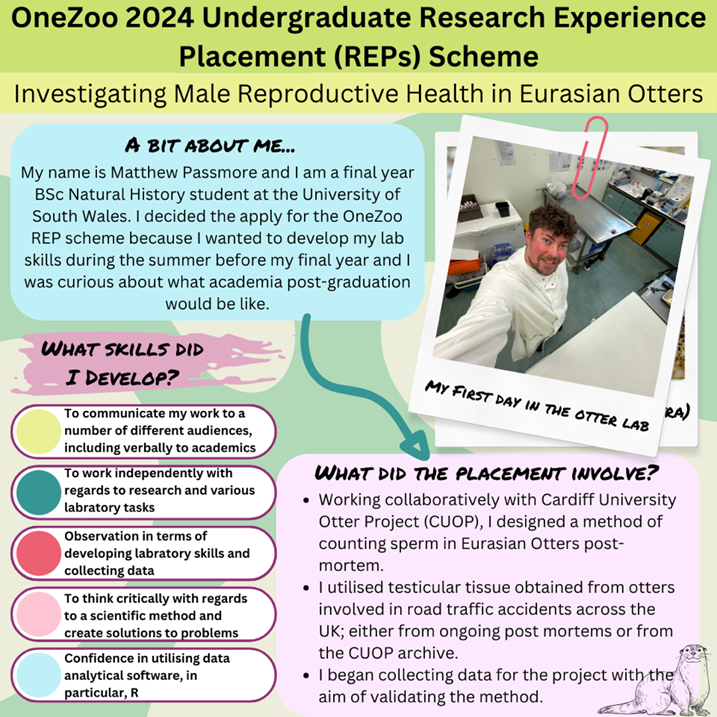
Aimie Davison – from Edge Hill University:
The placement with one zoo was an incredible opportunity that I am grateful to of experienced. It was exceptionally beneficial to me in a multitude of ways. It has provided reassurance of my choices alongside helping me determine the aspects of biology I want to focus on and engage with going forward in my career.
I very much enjoyed my time there and found it to be a fulfilling way to spend 6 weeks over summer while gaining experience in the biological field. Additionally, it has granted me a strong foundation in both experience and connections. This has helped me broaden my considerations for post graduate options, especially with considering a PhD. Over the 6 weeks I worked in both a molecular laboratory and a wet laboratory. It was my first time working in a wet lab which was especially exciting due to it allowing me to develop an entirely new set of skills like fish husbandry (the fish were incredibly cute!). It also significantly broadened the range of my experience. Along with these new skills it gave me chance to focus on my molecular based skills, this enabled the continuation of improvement in basic lab skills like pipetting to running protocols for PCRs, DNA extractions (extending into eDNA), gels and such. It was great to participate in active research at such an early stage in my degree (having just finished first year), it has helped reassure me that even with my ASD I am capable of working and excelling in this field.
Overall, everyone was lovely and so accommodating which made it such a joy to go in each day. I found it to be a fantastic opportunity that I am so fortunate to have had. I also had a lovely time exploring Cardiff.
Sophie Harries – from Aberystwyth University:
During my Research Experience Placement with OneZoo, I improved and acquired laboratory skills and techniques, while gaining a deeper understanding of
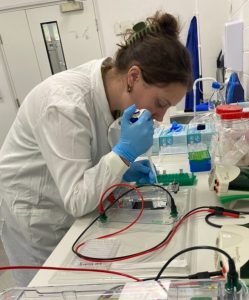
Mycobacterium bovis transmission between wildlife and cattle and the implications of bovine tuberculosis (bTB) on cattle herds, farmers and wildlife through literature evaluation.
I visited the Wales Centre for Mycobacteria (WCM) and the Wales Genomic Health Centre (Canolfan Iechyd Genomig Cymru, CIGC) in Cardiff to expand my knowledge of the techniques used for studying human tuberculosis. During the visit, I learned about heat inactivation, qPCR, and the specific primers used to target different species of mycobacteria. I also explored the process of method validation, such as spiking samples for testing, as well as whole genome sequencing and bioinformatics.
Additionally, I visited the Centre of Excellence for Bovine Tuberculosis (CBTB) in Aberystwyth to gain a deeper understanding of bTB research. There, I practiced various laboratory techniques, including culturing and extracting M. bovis Bacille Calmette-Guérin (BCG) SSI and Tokyo strains, as well as performing PCR and electrophoresis in a Containment Level 2 (CL2) lab. This was an invaluable opportunity to apply the techniques shown at WCM and CIGC. I also participated in lab meetings, which provided valuable insights into an environmental science career and interesting discussions surrounding research, including the effects of M. bovis infection and prevalence on badger population structure in which I created a map on QGIS to visualise the location of badger samples across Wales.
This placement has allowed me to explore new topics, and I have thoroughly enjoyed learning more about the environmental and social impacts of mycobacteria. I am excited for the coming weeks and months, as through networking during my placement, I will be assisting at the AberTB Conference in Aberystwyth and continuing this research into my final year dissertation.
Emi Jelamschi – from Cardiff University:
My recent research experience placement with OneZoo was a truly rewarding experience. As a Biological Sciences student, I was excited to contribute my educational background to a unique research project and gain insights into the world of environmental and epidemiological research.
My project involved contributing to a meta-analysis investigating the potential of wildlife-vehicle collisions (WVCs) as a tool for zoonotic disease monitoring, with an emphasis on parasitic infections. In addition to the project, I was responsible for data collection for a citizen science project called The Road Lab.
Throughout the internship, I enhanced my data analysis, critical thinking, and scientific writing skills which I look forward to applying in future projects. Anoth
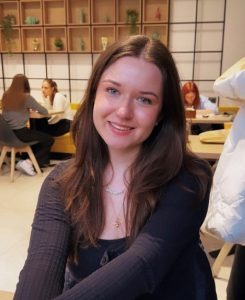 er aspect I really enjoyed was collaborating with other interns and learning about their projects as well, it was great to exchange ideas and gain different perspectives, making the whole experience even more enriching.
er aspect I really enjoyed was collaborating with other interns and learning about their projects as well, it was great to exchange ideas and gain different perspectives, making the whole experience even more enriching.
Presenting findings during weekly meetings also helped build my confidence in communicating effectively to a diverse audience. Additionally, I learned a great deal from my supervisors, they were very supportive and approachable. The feedback I was given during the experience was not only helpful but informative, I appreciate the way my supervisors and the rest of the OneZoo team guided me through the project.
Overall, the REP greatly enhanced my skills and deepened my understanding of collaborative research in the field.
Laura Hutchinson – from Swansea University:
I’ve just completed my six-week research experience placement with OneZoo CDT at Cardiff University, where I was studying the effects of plastic additive chemicals on Daphnia magna. My main responsibilities included maintaining a healthy D. magna stock, screening Daphnia under a microscope to assess their health, and helping design experiments to test the impact of flame retardants on Daphnia. A significant part of my time in the lab involved identifying key anatomical features like the heart and mandible, as well as becoming familiar with the Daphnia life cycle and distinguishing between asexual and sexual reproduction.
One of the biggest challenges I faced during this placement was the chemistry involved in ecotoxicology, especially since I hadn’t studied chemistry since high school. Although it was a steep learning curve, I enjoyed the challenge, and this experience gave me a much stronger appreciation for the interdis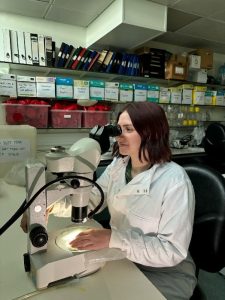 ciplinary nature of scientific research. Learning how to connect biological observations with chemical processes was both rewarding and eye-opening.
ciplinary nature of scientific research. Learning how to connect biological observations with chemical processes was both rewarding and eye-opening.
Working in the lab alongside professionals was an invaluable experience. I gained practical skills in microscopy, learned how to design and run experiments, and got a real sense of what working in a research environment is like. This placement has also given me a clearer vision for my future after university and I now feel more confident about pursuing further research.
I’m incredibly grateful for this opportunity and want to thank everyone who made this placement possible, especially my supervisor, Numair Masud, who has been an excellent mentor over the last few months. I’m excited to apply what I’ve learned to my future studies and career.
Faiz Syafie: from the London School of Economics
This summer, I had the incredible opportunity to join OneZoo’s Undergraduate Research Experience Placement (REP) Scheme at Cardiff University, working in the wet lab with fish and parasites. Despite my background in Actuarial Science, I embraced the chance to explore a completely different research area. This experience deepened my appreciation for research flexibility and the value of transferable skills to work in new and different contexts.
I was put under the supervision of Steve Cheung, who oversaw my tasks and learning process. For the most part, I got to understand the context of the research topics that were done at the lab, about fish husbandry and the Home Office regulations for working with living vertebrates. As part of being in the lab, I also helped out with routine lab tasks such as recording parasites and also general maintenance of the lab. As someone majoring in a quantitative field, I also appreciated that I got to practise and polish my statistical analysis methods through coding workshops in R. I had the chance to see the methods I was already familiar with but in a new, unfamiliar context.
Additionally, I had the chance to participate in fieldwork for a project on water voles. With support from Nia, the project lead, and fellow student Megan, I learnt to collect, record, and store samples while developing my navigation and planning skills from having to map out coordinates and optimising our routes. This was entirely new to me and incredibly rewarding, especially since I would not normally have access for such ‘hands-on’ research experiences.
Overall, this experience was immensely beneficial, and I am grateful to be able to participate in this scheme. I look forward to apply what
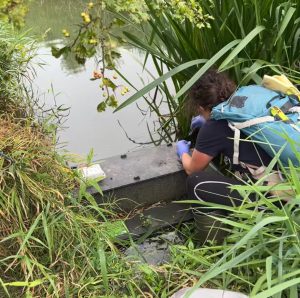 I’ve learned in these short 6 weeks to future opportunities.
I’ve learned in these short 6 weeks to future opportunities.
